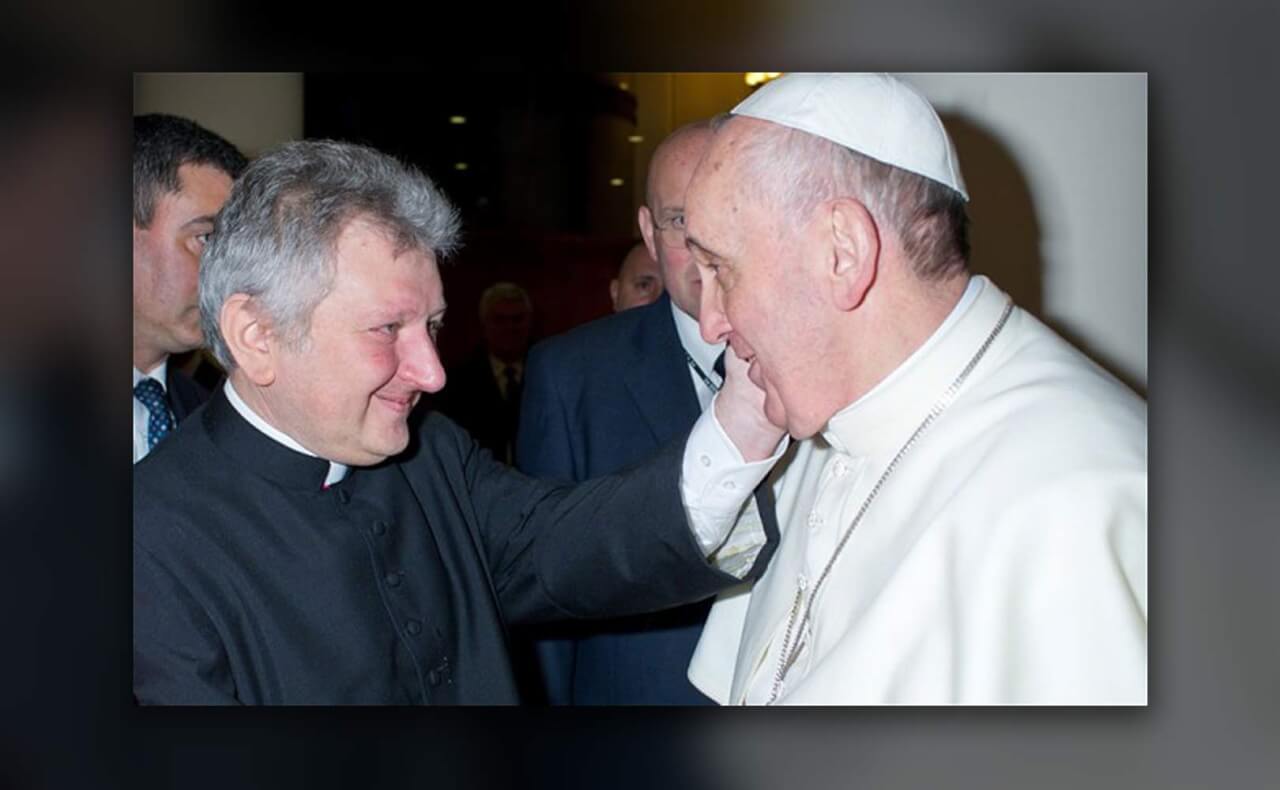I’ve been under the impression for a while now that everyone knew about Msgr. Battista Ricca, who is the director of the Casa Santa Marta (where the pope lives) and was the pope’s hand-picked liaison – his “eyes and ears” – on Vatican Bank reform.
But I saw a post from a well informed Catholic this week indicating that he hadn’t heard the story. So I decided it would be of value to repeat what I know here (as I have already done on social media). Faced as we are with the issue of homosexuals in the clergy, it is important to know that it was in the context of a question about Ricca that Francis first infamously said, “Who am I to judge?”
As I reported last year:
Also of note is the fact that the pope’s hand-picked liaison to the now-stalled Vatican Bank Reform, Msgr. Battista Ricca, was claimed to have outraged church figures in Uruguay during a diplomatic posting in 1999, when he moved “his lover, Patrick Haari, a Swiss army captain, in with him”, only to later have Haari forced out by apostolic nuncio Janusz Bolonek in 2001. Ricca was caught later that year in an elevator, where he was “trapped with a youth known by local police” after being attacked at a “cruising ground” – a meeting place for area homosexuals. There is no indication that Ricca has been removed of his position as Prelate the Vatican Bank, despite indications that his past was hidden from the pope and reports of his offered resignation as long ago as 2013. Less well known is the fact that it was in reference to a specific question about Msgr. Ricca that Pope Francis infamously responded, “Who am I to Judge?”
So what was the context for the pope’s infamous comment? When Francis was flying back from Rio for World Youth Day in 2013, he was asked the following question, and he gave the subsequent answer. It’s an eye-opener when people put this in context:
Ilze Scamparini:
I would like permission to ask a delicate question: another image that has been going around the world is that of Monsignor Ricca and the news about his private life. I would like to know, Your Holiness, what you intend to do about this? How are you confronting this issue and how does Your Holiness intend to confront the whole question of the gay lobby?
Pope Francis:
About Monsignor Ricca: I did what canon law calls for, that is a preliminary investigation. And from this investigation, there was nothing of what had been alleged. We did not find anything of that. This is the response. But I wish to add something else: I see that many times in the Church, over and above this case, but including this case, people search for “sins from youth”, for example, and then publish them. They are not crimes, right? Crimes are something different: the abuse of minors is a crime. No, sins. But if a person, whether it be a lay person, a priest or a religious sister, commits a sin and then converts, the Lord forgives, and when the Lord forgives, the Lord forgets and this is very important for our lives. When we confess our sins and we truly say, “I have sinned in this”, the Lord forgets, and so we have no right not to forget, because otherwise we would run the risk of the Lord not forgetting our sins. That is a danger. This is important: a theology of sin. Many times I think of Saint Peter. He committed one of the worst sins, that is he denied Christ, and even with this sin they made him Pope. We have to think a great deal about that. But, returning to your question more concretely. In this case, I conducted the preliminary investigation and we didn’t find anything. This is the first question. Then, you spoke about the gay lobby. So much is written about the gay lobby. I still haven’t found anyone with an identity card in the Vatican with “gay” on it. They say there are some there. I believe that when you are dealing with such a person, you must distinguish between the fact of a person being gay and the fact of someone forming a lobby, because not all lobbies are good. This one is not good. If someone is gay and is searching for the Lord and has good will, then who am I to judge him? The Catechism of the Catholic Church explains this in a beautiful way, saying … wait a moment, how does it say it … it says: “no one should marginalize these people for this, they must be integrated into society”. The problem is not having this tendency, no, we must be brothers and sisters to one another, and there is this one and there is that one. The problem is in making a lobby of this tendency: a lobby of misers, a lobby of politicians, a lobby of masons, so many lobbies. For me, this is the greater problem. Thank you so much for asking this question. Many thanks.
If you, like me, think the homosexual infiltration of the clergy is at the root of much of the corruption we are facing in the Church today, this should be a strong indicator that we have enormous obstacles to overcome before we can begin to address the issue. Some people will point to the pope’s recent negative comments about homosexuals in the priesthood as an indication he’s on the side of the angels with this. But I encourage people to remember The Perón Rule. Don’t look at what he says. Look at what he does. Personnel is policy, and actions speak louder than words.


